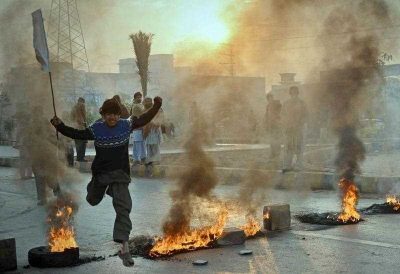Author: Sajjad Ashraf
Pakistan is in a state of discord. Its civilian governance structure is becoming corrupt and oligarchic. Its façade of democratic order belies a more tawdry reality characterised by money, patronage and cronyism, in which parliament exists to enhance the privileges of the few.
Pakistan’s problems are long-standing, rooted in governance failures, with the resultant erosion of state authority. 2014 was no different in this respect.

Pakistan’s civil-military divide, manifested in the government’s clumsy handling of former President General Pervez Musharraf, remained at the centre of Pakistan’s political debate through the year.
Prime Minister Nawaz Sharif locked horns with the army by preventing the General from going abroad, after the courts granted him bail in several politically motivated cases. The army showed that it would not stand by when its former chief was insulted. In this process, Sharif was the loser. The mistrust between the military and the civilian government was palpable.
The Sharif government was rocked by simultaneous sit-ins by Tahir-ul Qadri’s Pakistan Awami Tehreek party and Imran Khan’s Pakistan Tehreek-e-Insaaf party in front of Parliament House in Islamabad, beginning in mid August. While Qadri folded quickly, Khan only wound up his protest in the wake of the Peshawar killings in December, winning kudos for showing statesmanship in a time of national crisis. The army repeated its desire for a political solution to this impasse and Khan’s tenacity in persisting with widespread agitation, while weakening Sharif, has helped the army to attain an even stronger political position.
Sharif showed little energy in tackling the problem of terrorism until the army took the initiative by launching Operation Zarb-e-Azb (Sword of the Prophet) in North Waziristan, following the terrorist attack on Karachi Airport in June. The latest reports indicate that 2100 militants and 190 servicemen have been killed in this operation.
A terrorist attack on an army-run school in Peshawar on 16 December killed 145 people, including 132 teenage children. This attack exposed the government’s lack of preparedness towards a menace that has claimed over 50,000 Pakistani lives over the last decade. When the nation clamoured for action, Sharif feebly announced that his government would set up a committee to draw up policy to tackle terrorism — forgetting that his own government had announced a National Internal Security Policy in February 2014.
Again, Prime Minister Sharif showed no sign of leadership. For him, building roads and talking the talk on development are panaceas for Pakistan’s problems. Large projects are waved through without stakeholder consultation on feasibility or environmental concerns. As an example, the metro bus project in Lahore is now being replicated in Islamabad. This 24 kilometre project could cost as much as 75 billion rupees (US$744 million). Stories of underhand behaviour abound in the awarding of state contracts. Public functionaries are replaced with political cronies when expensive national projects or imports are negotiated.
Sharif’s governance style — one that heavily involves his family and a coterie of associates — easily degenerates into the politics of patronage. Parliamentary oversight is inadequate. Cabinet meetings, when they are held, are devoid of substance. Pakistan’s minorities also suffer the wrath of religious fanatics and those who raise the spectre of blasphemy allegations in order to eject people from their homes.
The Sharif government has been lethargic when it comes to reforming Pakistan’s healthcare, education and skills programs. Over 25 million children do not attend school and Pakistan ranks second from the bottom in South Asia according to arecent UN Human Development Report.
Finally, the government’s record on economic management leaves much to be desired. The recently released State Bank of Pakistan (SBP) annual report confirms that national debt has increased by 25 per cent in the 17 months or so that the government has been in power, while the number of taxpayers has actually declined to a mere 1.7 million in a population of 186 million. This jeopardises Pakistan’s future.
Pakistanis deserve much better in 2015. They are unlikely to be so lucky.
No comments:
Post a Comment